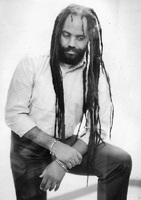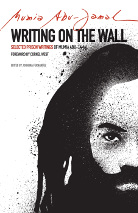
zurück "zu Bücher von und über Mumia Abu-Jamal"
Impressum Datenschutzerklärung

Bücher von und über Mumia Abu-Jamal

Jamal, Mumia Abu-: Writing on the wall
Selected writings of Mumia Abu-Jamal
Sprache English
333 Seiten, 2015 - ca. 17.50 Eur - ISBN: 978-0-87286-675-1
Erscheint voraussichtlich Juli 2015
Edited by Johanna Fernández with a foreword by Cornel West
"Revolutionary love, revolutionary memory and revolutionary analysis are at work in every page written by Mumia Abu-Jamal. . . . His writings are a wake-up call. He is a voice from our prophetic tradition, speaking to us here, now, lovingly, urgently. Black man, old-school jazz man, freedom fighter, revolutionary-his presence, his voice, his words are the writing on the wall." -Cornel West, from the foreword
City Lights Books is proud to release Writing on the Wall, Selected Prison Writings of Mumia Abu Jamal, edited by Johanna Fernández with a foreword by Cornel West.
Writing on the Wall presents a selection of over 100 previously unpublished essays spanning the entire period of Mumia Abu-Jamal's incarceration that crystalize his essential perspectives on community, politics, protest, history, social change and movement organizing in the U.S. and internationally. From discussions of Rosa Parks and Trayvon Martin, to Martin Luther King and Edward Snowden, Abu-Jamal articulates lucid, humorous and often prescient insight into the past, present and future of American politics and society. Written as radio commentaries from his prison cell on Death Row where he was held in solitary confinement for close to 30 years, Mumia's revolutionary perspective brims with hope, encouragement and profound faith in the possibility of social transformation.
Published at a moment when the nation is grappling with the realities of-and backlash to-police violence in communities of color, Writing on the Wall couldn't be more relevant, provocative or timely, and reads like a syllabus for understanding the daily civic and political realities of those marginalized by racism and class inequality.
Abu-Jamal is no stranger to such realities, and was the target of an unrelenting surveillance campaign from the time he was a 16 year-old sixties activist and long before the fateful night when he himself was shot, beaten and arrested by white Philadelphia police. From the moment he was taken into custody, Mumia has been subjected to gross violations of his rights, violations which have been well documented by Amnesty International and denounced by world leaders including Nobel Laureate, Bishop Desmond Tutu. These violations continue right up to the present time through U.S. authorities' attempt to censor his speech and deny him adequate medical treatment required to address his life-threatening illness. At the moment we are at press, Mumia's medical condition is fragile and uncertain. A half-page ad was recently placed in the New York Times to demand that his health not be further neglected by state officials. Of his current peril, Alice Walker writes that Mumia is "a rare and courageous voice speaking from a place we fear to know...losing that voice would be like losing a color from the rainbow."
"Like other imprisoned dissidents such as Antonio Gramsci, Sacco and Vanzetti, Eugene Debs, Malcolm X and George L. Jackson," writes Johanna Fernández in her introduction to Writing on the Wall, "Mumia commits to articulating the voices of millions. He presents not just a black counter-narrative to the prevailing formulations of white supremacy, but a redemptive script that strives to achieve a society in which social domination, violence and indignity are both unconscionable and impossible." "The freedom he seeks," says James Cone, "is greater than the freedom he lost."
It is our hope that Writing on the Wall will contribute to the wider pursuit of such freedom and be read as a living contribution to the emancipatory tradition of African American literature, a tradition which champions the triumph of human conscience and dignity over state violence and oppression. Further, it is our hope that this document of Mumia's humanity, insight, intelligence, and commitment will stand as a tribute to one of America's most articulate and dedicated messengers of liberation.
"Greatness meets us in this book, and not just in Mumia's personal
courage and character. It's in the writing. This is art with political
power, challenging institutional injustice in the U.S. while catalyzing
our understanding, memory and solidarities for liberation and love.
Writing on the Wall can set the nation aflame-yes, for creating new
possible worlds."
Mark Lewis Taylor, Princeton Theological Seminary
"Abu-Jamal (has an) ever-lucid voice and humanistic point of
view...eloquent and indelible."
Booklist
"Uncompromising, disturbing...Abu-Jamal's voice has the clarity and
candor of a man whose impending death emboldens him to say what is on
his mind without fear of consequence."
The Boston Globe
"Mumia refuses to allow his spirit to be broken by the forces of
injustice; his language glows with an affirming flame."
Jonathon Kozol
"Mumia Abu-Jamal is one of the most important public intellectuals of
our time... He offer(s) us new ways of thinking about law, democracy, and
power. He allows us to reflect upon the fact that transformational
possibilities often emerge where we least expect them."
-Angela Y. Davis
(Buchbesprechung) Mumia Abu-Jamal's Eighth Book: Writing On The Wall...

